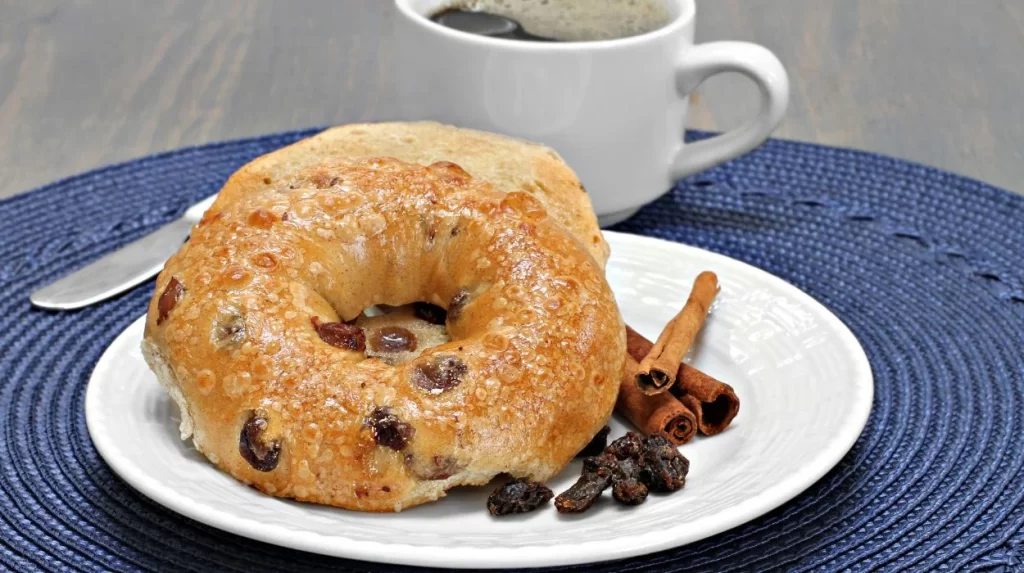In the world of vegan-friendly food choices, bagels have garnered considerable curiosity. Are bagels vegan-friendly? While they can be, there are a few factors to consider that may affect their vegan status.
Bagels, like bread, are crafted from a simple blend of ingredients, including flour, water, yeast, and salt. These ingredients are inherently plant-based, making many plain bagels suitable for vegans.
However, some variations of bagels can introduce non-vegan ingredients, such as eggs, milk, or honey, which can render them unsuitable for a vegan diet.
In this article, we will examine the vegan-friendly aspects of bagels, exploring the various ingredients used in traditional and alternative bagel recipes. Understanding these intricacies will help you make informed choices so you can enjoy your bagels while staying true to your vegan principles.
Are Bagels Vegan?
Yes, bagels can be vegan-friendly, but it depends on the specific ingredients used in their preparation.
Traditionally, bagels are made from flour, water, yeast, salt, and sometimes sugar. These basic ingredients are plant-based and suitable for a vegan diet, but some bagels may contain non-vegan ingredients, such as eggs, milk, or honey. This can render them unsuitable for vegans.
So, you’ll need to check the ingredient list or ask about the preparation process to ensure the bagels you consume align with a vegan lifestyle.
Do Vegans Eat Bagels?
Of course! Bagels are a beloved part of the plant-based diet embraced by vegans.
These treats are crafted using vegan-friendly ingredients[1], like flour, water, yeast, and salt. As the demand for plant-based options continues to grow, many bakeries and brands offer the best vegan bagels to cater to the unique preferences of vegans.
The versatility of bagels allows for many exciting plant-based possibilities. Vegans can experiment with various flavors by incorporating plant-based ingredients such as aromatic herbs, fragrant spices, wholesome seeds, or dried fruits.
From vegan cream cheese and crisp, fresh vegetables to indulgent, sweet variations, the world of vegan bagels offers endless opportunities for culinary creativity.
Which Type Of Bagel Is Vegan?
To determine which bagels are suitable for a healthy diet, you must carefully consider the ingredients used to make them. While plain bagels are generally recognized as vegan-friendly, certain flavors or variations may introduce non-vegan components.
Let’s dig deeper into the ingredients of some popular types of bagels and explore their compatibility with a vegan lifestyle:
Classic Bagel
A classic bagel is typically a simple combination of flour, water, yeast, and salt. These fundamental ingredients make traditional bagels a reliable choice for vegans. They serve as a canvas for various toppings and spreads, enabling vegans to personalize their bagel experience according to their preferences.
Sesame Bagel

Sesame bagels boast a coating of sesame seeds[2], offering a nutty flavor and a pleasing crunch. Most sesame bagels align with a vegan lifestyle since the seeds contain no animal-derived ingredients.
However, confirming that the bagel dough doesn’t have non-vegan additives or enrichments is still important.
Poppy Seed Bagel
Like sesame bagels, poppy seed bagels[3] exhibit a distinctive appearance and taste due to their layer of poppy seeds. Since poppy seeds are plant-based, they are, therefore, vegan-friendly. Enjoy them with dairy-free cream cheese and a drizzle of barley malt syrup.
Cinnamon Raisin Bagel

Cinnamon raisin bagels[4] offer a blend of sweetness and flavor, featuring a dough enriched with cinnamon and adorned with raisins.
The primary ingredients, such as flour, water, yeast, cinnamon, and raisins, are typically vegan-friendly. However, it’s still important to be aware of potential non-vegan ingredients, such as honey or dairy-based glazes.
Whole Wheat Bagel
Whole wheat bagels, made with whole wheat flour, water, yeast, and salt, provide a healthier and more nutritious option than many other bagels. Whole wheat bagels are generally compatible with a vegan diet and can even include fruits and veggies on the side. Spread dairy-free cream cheese on top for a wholesome and satisfying treat.
While most bagel varieties mentioned are commonly suitable for vegans, it is necessary to assess the specific brand, recipe, and variant to ensure they align with your vegan dietary choices.
Vegans can confidently savor a delectable assortment of bagels by exercising caution, reading labels, and seeking information from manufacturers or bakeries. This can be done without compromising their commitment to a plant-based lifestyle.
Ingredients To Avoid While Making
When making vegan bagels, one should be mindful of certain ingredients typically avoided in a vegan diet. Steering clear of the following is a great way to ensure your bagels remain entirely plant-based:
Animal-Derived Ingredients
Avoid using ingredients like eggs, milk, butter, honey, or any other products derived from animals. These ingredients are not considered vegan-friendly.
Gelatin
Gelatin is a common ingredient in some bagel recipes, but it is derived from animal bones[5] and tissues. Opt for plant-based alternatives like agar-agar[6] or other vegan-friendly gelling agents.
L-Cysteine
L-cysteine is an amino acid commonly used as a dough conditioner[7] in some commercial baked goods, including bagels. It can be derived from animal sources, so it is best to opt for bagels that explicitly state they are free from L-cysteine or choose homemade recipes that don’t include this ingredient.
Whey Powder
Whey is a byproduct of cheese[8] production and is often found in bagel recipes or commercial bagel mixes. Look for vegan alternatives or recipes using plant-based milk powders or protein substitutes.
Non-Vegan Additives
Be cautious of other additives or flavorings that may contain non-vegan components, such as certain food colorings, flavor enhancers, or preservatives. Always read the labels carefully or opt for homemade recipes where you have full control over the ingredients included.
How To Be Sure Your Bagel Is Vegan
To ensure that your bagel aligns with your vegan lifestyle, here are some additional tips to help you navigate your choices:
Check The Ingredients
Before purchasing or indulging in a bagel, carefully examine the ingredient list. Keep an eye out for animal-derived components like eggs, milk, butter, honey, or whey. Additionally, be cautious of any additives or flavorings containing non-vegan ingredients. Be especially careful about traditional bagel toppings.
If the ingredient list is not readily available, don’t hesitate to contact the manufacturer for clarification. Or, choose homemade bagels from vegan bagel recipes.
Look For Vegan Labels
Many brands now provide clear labeling, explicitly indicating that their bagels are vegan. Watch for phrases such as vegan-friendly or suitable for vegans, or look for a certified vegan logo. Spotting these labels will grant you the confidence that the bagel perfectly aligns with your dietary preferences.
Explore Plant-Based Alternatives
If you find yourself uncertain about the vegan status of a particular bagel, consider trying out plant-based alternatives.
Green powders, crafted from nutrient-rich plants, can wonderfully enhance your bagel experience. Not only do they offer additional nutritional benefits, but they also contribute to a more tantalizing flavor profile for your meal.
Embrace Vegan Meal Delivery And Replacement Options
Another fantastic way to ensure your bagel is vegan-friendly is by exploring vegan meal delivery services or vegan meal replacement options. These services cater specifically to individuals following a plant-based diet. They also present an array of certified this vegan containing necessary vitamins and minerals that can be conveniently delivered straight to your doorstep.
Final Thought
Ultimately, when it comes to embracing bagels as a vegan, it is crucial to approach the matter with mindfulness and informed decision-making. While plain bagels generally align with vegan principles, it is important to remain aware of the potential presence of non-vegan ingredients in various flavors and variations.
By scrutinizing ingredient labels, seeking out vegan-labeled options, and exploring vegan bakeries or cafes, you can continue to adhere to a vegan lifestyle. You can also enjoy a wide array of healthy and interesting bagel choices.
With the ever-expanding availability of vegan alternatives and the boundless creativity of plant-based ingredients, bagel enjoyment knows no bounds for those dedicated to the vegan ethos.
Frequently Asked Questions
What kind of bagels are vegan?
Plain bagels made with basic ingredients like flour, water, yeast, and salt are typically vegan-friendly. However, variations and flavors may introduce non-vegan ingredients, so checking labels or inquiring about specific brands or recipes is essential.
Do bagels contain eggs?
Some bagel recipes may include eggs, depending on the specific recipe or brand. Vegans should look for egg-free or explicitly labeled vegan bagels.
Are New York-style bagels vegan?
New York-style bagels can be vegan, depending on the specific ingredients used in their preparation. Plain New York-style bagels made with basic vegan-friendly ingredients are available, but variations or flavors may include non-vegan ingredients.
Can vegans eat bagels and cream cheese?
Yes, vegans can enjoy bagels and cream cheese. Various plant-based cream cheese substitutes are crafted from ingredients like nuts or tofu that cater to vegan preferences.
Are cinnamon raisin bagels typically vegan?
Cinnamon raisin bagels can be vegan-friendly, but you must check the specific ingredients used, as some variations may include non-vegan additives.
Are sesame seed bagels usually vegan?
Sesame seed bagels are often vegan-friendly since they primarily contain basic vegan ingredients. However, confirming the specific product or recipe would be best to ensure vegan-friendliness.
Are all bagels typically vegan?
Everything bagels can be vegan-friendly, but checking the seasoning mix ingredients is essential, as some variations may include non-vegan additives like milk or cheese powder.
Are cheese bagels vegan?
Cheese bagels are typically not vegan since they contain dairy cheese. However, vegan alternatives are available that mimic the flavor and texture of cheese without animal-derived components.
+ 8 Sources
- Lasekan, O., Fatma Dabaj, Megala Muniandy, N.H. Juhari and Adeseye Lasekan (2021). Characterization of the key aroma compounds in three types of bagels by means of the sensomics approach. [online] 15(1). doi:https://doi.org/10.1186/s13065-021-00743-4.
- Koppelman, S.J., Gülsen Söylemez, Niemann, L., Gaskin, F.E., Baumert, J.L. and Taylor, S.M. (2015). Sandwich Enzyme-Linked Immunosorbent Assay for Detecting Sesame Seed in Foods. [online] 2015, pp.1–10. doi:https://doi.org/10.1155/2015/853836.
- Chatchai Ngernsaengsaruay, Nisa Leksungnoen, Pichet Chanton, Tushar Andriyas, Pratchaya Thaweekun, Surasak Rueansri, Ratthapon Tuntianupong and Woottichai Hauyluek (2023). Morphology, Taxonomy, Anatomy, and Palynology of the Opium Poppy (Papaver somniferum L.) Cultivation in Northern Thailand. [online] 12(11), pp.2105–2105. doi:https://doi.org/10.3390/plants12112105.
- Usda.gov. (2023). FoodData Central. [online] Available at: https://fdc.nal.usda.gov/fdc-app.html#/food-details/172665/nutrients
- Mikhailov, O.V. (2023). Gelatin as It Is: History and Modernity. [online] 24(4), pp.3583–3583. doi:https://doi.org/10.3390/ijms24043583.
- Das, N., Naveen Mani Tripathi, Basu, S., Bose, C., Maitra, S. and Khurana, S. (2015). Progress in the development of gelling agents for improved culturability of microorganisms. [online] 6. doi:https://doi.org/10.3389/fmicb.2015.00698.
- PubChem (2023). Cysteine. [online] @pubchem. Available at: https://pubchem.ncbi.nlm.nih.gov/compound/Cysteine
- Ilija Barukcic, Katarina Lisak Jakopovic and Rajka Božanic (2019). Valorisation of Whey and Buttermilk for Production of Functional Beverages – An Overview of Current Possibilities. [online] 57(4), pp.448–460. doi:https://doi.org/10.17113/ftb.57.04.19.6460.
